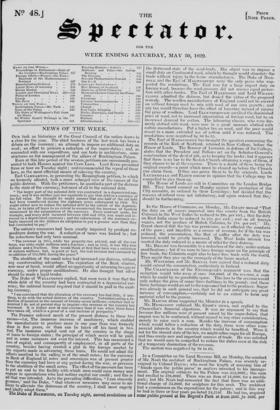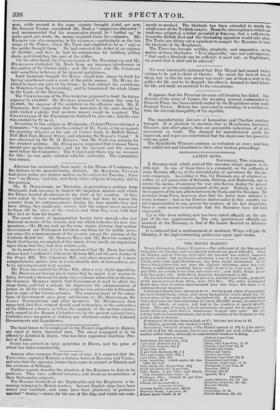In a Committee on the Land Revenue Bill, on Monday,
the conduct of Mr. Nash the architect of Buckingham Palace, was severely ar- raigned by Colonel DAVIS; who went the length of accusing him of "frauds upon the public purse" in matters intrusted to his manage- ment. The original estimate for the Palace was 252,0001.; this sum had swelled to 496,0001. There was an item of 16,0001. for a marble arch; but Mr. Nash had concealed the fact that there was an addi- tional charge of 34,0001. for sculpture for this arch. The architect had a commission on the expenditure for the palace ; and in this way he had in three or four years pocketed 24,310/. He had too, acquired some public ground at the Regent's lark at from 2604 to 3601, per acre, while ground in the same vininity brought 45001. per acre. Sir JOSEPH YORKE considered Mr. Nash a " suspicious character ;" and recommended that his commission should be " bottled up," to make good, pro tanto, the money required above his estimates. Mr. BANKES was also unsparing in his censures,—particularly on the late wings of the Palace, which Mr. Nash had admitted to be as " ugly as the public thought them." He had corrected the defect at an expense of 50,0004 ; and here he had his commission for building, pulling down, and rebuilding this part of the edifice. On the other hand, the CHANCELLOR of the EXCHEQUER and Mr. HUSKISSON vindicated Mr. Nash from any improper interference in the matter of the Crown lands ; and Mr. JONES and Mr. COLBURN said something in favour of his general uprightness. Lord ALTHORP thought the House should take shame to itself for having sanctioned such a waste of the public money. Mr. HUME de- clined to have any part of the blame : he had refused his confidence to Ministers from the beginning ; and he transferred the whole blame to the Lords of the Treasury.
The CHANCELLOR of the EXCHEQUER proposed to limit the future expense to 150,000/. Mr. BANK ES proposed to reduce this sum by 34,0001., the expense of the sculpture on the offensive arch. Mr. P. THOMSON, first suggesting that the materials of the arch should be sold, wished a pledge that no more money would be required. The CHANCELLOR of the EXCHEQUER declined to give one ; and his vote was carried by 91 to 61. Reverting to this subject on Wednesday, Colonel DAVIS obtained a Committee " to inquire into the conduct of Mr. Nash, so far as regards the granting of leases or the sale of Crown lands in Suffolk Street, Pall Mall East, Regent Street, and adjoining the Regent's Canal." It was observed by Sir W. M. RIDLEY, that Mr. Nash was anxious for the strictest scrutiny. Mr. HusxissoN suggested that Colonel Davis should give up his authority ; and let the accused and the accuser meet before the Committee. The Colonel said there was no occasion for this : he was quite satisfied with his authority. The Committee was named.
Allusion has occasionally been made, in the House of Commons, to the distress in the manufacturing districts. Sir RICHARD VYVYAN had given notice of a distinct motion on the subject for Tuesday ; there was " no House," and this, and thirty other subjects of inquiry, fell to the ground.
Mr. E. DAVENPORT, on Thursday, in presenting a petition from Stockport, took occasion to lament the impatient manner with which the House treated all allusions to the state of the country. If they were asked by their constituents what they had done to rescue the country from its embarrassments during the four months they had been sitting, they could only answer that the subject never occurred to them till the close of the session, and then they were told that they had no time for inquiry. The usual clause, of appropriation having been moved,—the last financial measure of the session, and one which indicates its near ter- mination,—Mr. HUME took up the same strain, showing that neither Government nor Parliament had done any thing for the public inter- est since the commencement of the session, except the passing of the Catholic Relief Act. Mr. SPRING Rich: and Mr. BENSON seemed to think that having accomplished this much, it was hardly an imputation upon them that they had clone nothing else. As to matters legal, it is to be mentioned that Mr PEEL has with- drawn Lord I.yndhursts Chancery Reform Bill and his own Justice of the Peace Bill. The Chancery Bill, and other measures of a more comprehensive nature, now in a considerable state of forwardness, are to be introduced early next session.
Mr. PEEL has carried his Police Bill, after a very slight opposition. Mr. BROUGHAM having given notice that he meant next session to brim. forward a measure to make slave evidence admissible in all cases, Sir GEORGE MURRAY stated, that Government desired to effect the same thing, and had a scheme for improving, the administration of justice in all the colonies. Slave evidence was admissible in Grenada, and in some of the Crown colonies. The announcement of the inten- tions of Government gave great satisfaction to Mr. BROUGHAM, Sir JAMES MacioNrosu, and other members. Mr. HUSK ISSON then suggested, that Government should send instructions to the authorities of the different colonies, to follow the example of the mother country with regard to the Roman Catholics—as by the present colonial laws, Catholics were incapable of holding any situations under the Colonial Governments and Legislatures.
The land forces to be employed in the French expedition to Algiers, are rated at thirty thousand men. The naval command is to be offered to Admiral de Rigny, who has been appointed Maritime Pre- fect at Toulon.
Grain has arrived in large quantities at Havre, and the price of wheat has fallen considerably.
Among other rumours from the seat of war, it is reported that the Turks have captured Balczyk, a fortress between Kaverna and Varna ; and also that the opposing armies have come in contact at Silistria and the environs of Schumla.
Further reports describe the situation of the Russians in Asia to be perilous. They have suffered reverses, and dread an insurrection of their Mahometan subjects. The Russian blockade of the Dardanelles and the Bosphorus is be- coming annoying to British traders. Several English ships have been seized and searched ; and some have been plundered of packages marked " stores,"—stores for the use of the ship, and which are cora- monly so marked. The blockade has been extended to nearly the whole coast of the Turkish empire. From the interruption to which our tradewas subjected, a belief prevailed at Smyrna, that a collision be- tween the British fleet and the blockading squadron would take place. The Turks are fitting out a squadron to compel the Russians to raise the blockade of the Bosphorus. The Times has become warlike, prophetic, and imperative, on the matter of these blockades. " It is impossible," says our contemporary, " that such a blockade can be suffered : it must not : as Englishmen, we assert that it shall not be allowed."
We were incorrectly informed that Don Miguel had caused twelve victims to be put to death at Oporto. He saved the lives of two of them, but in this his very mercy was cruel: one of them is sent to the gullies for life, and to be flogged ; the other is doomed to hard labour for life, and made an assistant to the executioner.
It appears that the Peruvian invasion of Colombia has failed. One division of the army of Lamar, the invading general, commanded by General Plaza, has been entirely routed by the Republican army under General Torres. Bolivar has succeeded in restoring, to a certain ex- tent, the internal tranquillity of the republic.



















